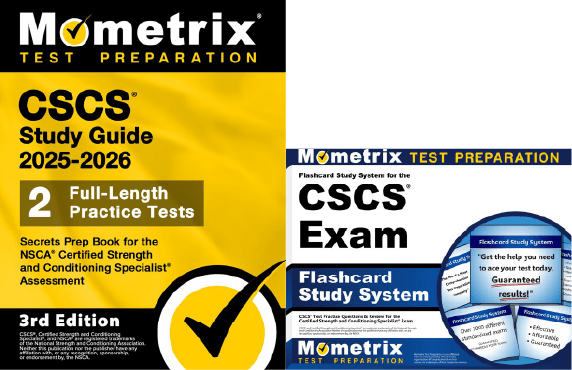If you need help studying for the Certified Strength and Conditioning Specialist (CSCS) exam or just want some more information about what the test is like, you’ve come to the right place.
Click below to take a free CSCS practice test!
Exam Eligibility
Before you can register to take the CSCS certification exam, you’ll have to meet the requirements below:
- You need a bachelor’s degree or higher
- You need a current CPR/AED certification
If you meet these requirements, you’re set to begin the registration process!
What’s on the Exam?
First, let’s talk about the questions on the exam. There are 150 multiple-choice questions total, but only 130 of the questions will count toward your score. Why is that?
The 20 unscored questions on the exam are called “pretest” questions. These are added to the exam to determine if they’re good enough questions to add to future versions of the test.
The trick is that you won’t have any way of knowing which questions are scored and which ones are pretest. They will appear just like the scored questions throughout the test.
The time limit for the exam is 4 hours, and there’s a scheduled 15-minute break between exam sections.
Each question falls under one of the following three cognitive levels:
- 🧠 Recall: The recall questions test your ability to recall/recognize information.
- 🛠️ Application: The application questions test your ability to apply knowledge to given situations.
- 🔍 Analysis: The analysis questions test your ability to analyze and evaluate solutions.
Let’s take a closer look at the two sections of the CSCS exam.
1. Scientific Foundations
80 scored questions
- Muscle anatomy and physiology
- Neuromuscular anatomy and physiology
- Principles of biomechanics
- Bone and connective tissue anatomy and physiology
- Bioenergetics and metabolism
- Neuroendocrine physiology
- Cardiopulmonary anatomy and physiology
- Physiological adaptations to exercise and training
- Differences among athletes
Sport Psychology (19 scored questions)
- Psychological foundations of performance
- Motor learning and skill acquisition techniques
- Indicators of mental health issues in athletes
Nutrition (17 scored questions)
- Nutritional factors that affect health
- Maximizing performance via nutrition
- Effects, risks, and alternatives of common supplements and methods
2. Practical/Applied
110 scored questions
- Movement preparation
- Resistance training
- Olympic weightlifting and plyometric exercise technique
- Speed/sprint technique
- Agility
- Energy systems development
- Recovery techniques
Program Design (38 scored questions)
- Conducting a needs analysis
- Incorporating various training methods and modes
- Selecting exercises
- Principles of exercise order
- Exercise intensities
- Training volumes
- Rest periods, recovery and unloading, and training assignments
- Exercise progression
- Periodization models and concepts
- Designing programs for athletes during injury/reconditioning period
Organization and Administration (12 scored questions)
- Organizational environment
- Design, layout, and organization of the strength and conditioning facility
- Professional practice
- Common litigation issues
Testing, Ongoing Monitoring, and Data Evaluation (20 scored questions)
- Selecting appropriate evidence-based tests to maximize test reliability and validity
- Administering testing and implementing monitoring protocols and procedures
- Evaluating and interpreting results
How to Register
Once you’ve ensured that you meet all of the eligibility requirements, you can register for the exam.
To get started, you’ll need to submit an application on NSCA’s website. The application will ask you for your contact information and any documentation to prove your eligibility (among other things), and you’ll need to pay the $25 application fee.
Once your application is approved, you can start the registration process! When you register for the exam, you’ll also need to submit the testing fee, which is $475. If you’re an NSCA member, you will only have to pay $340.
Exam Scores
The test is scored using a scaled scoring method. Here’s how it works:
For every question you answer correctly, you get one point added to your raw score. At the end of the test, your final raw score will be converted to a scaled score. This scaled score will range somewhere between 1 and 100.
The reason your raw score is converted to a scaled score is because everyone who takes the CSCS certification test is given a slightly different set of questions. Since everyone has a different arrangement of questions, and because some questions are harder than others, converting your raw score to a scaled score ensures a more even playing field.
Retaking the Exam
If you didn’t get a passing score on your first try, that’s okay! You can retake the test after a 30-day waiting period.
Keep in mind that you will have to pay the full testing fee every time you retake the full test.
FAQs
How many questions are on the CSCS exam?
The exam contains 220 questions.
What is the time limit for the CSCS exam?
The exam is timed at 4 hours.
What is the passing score for the CSCS exam?
You’ll need to get a final scaled score of at least 70 to pass.
How much does the CSCS exam cost?
The testing fee is $475 ($340 for NSCA members).



 CSCS Study Guide
CSCS Study Guide CSCS Flashcards
CSCS Flashcards